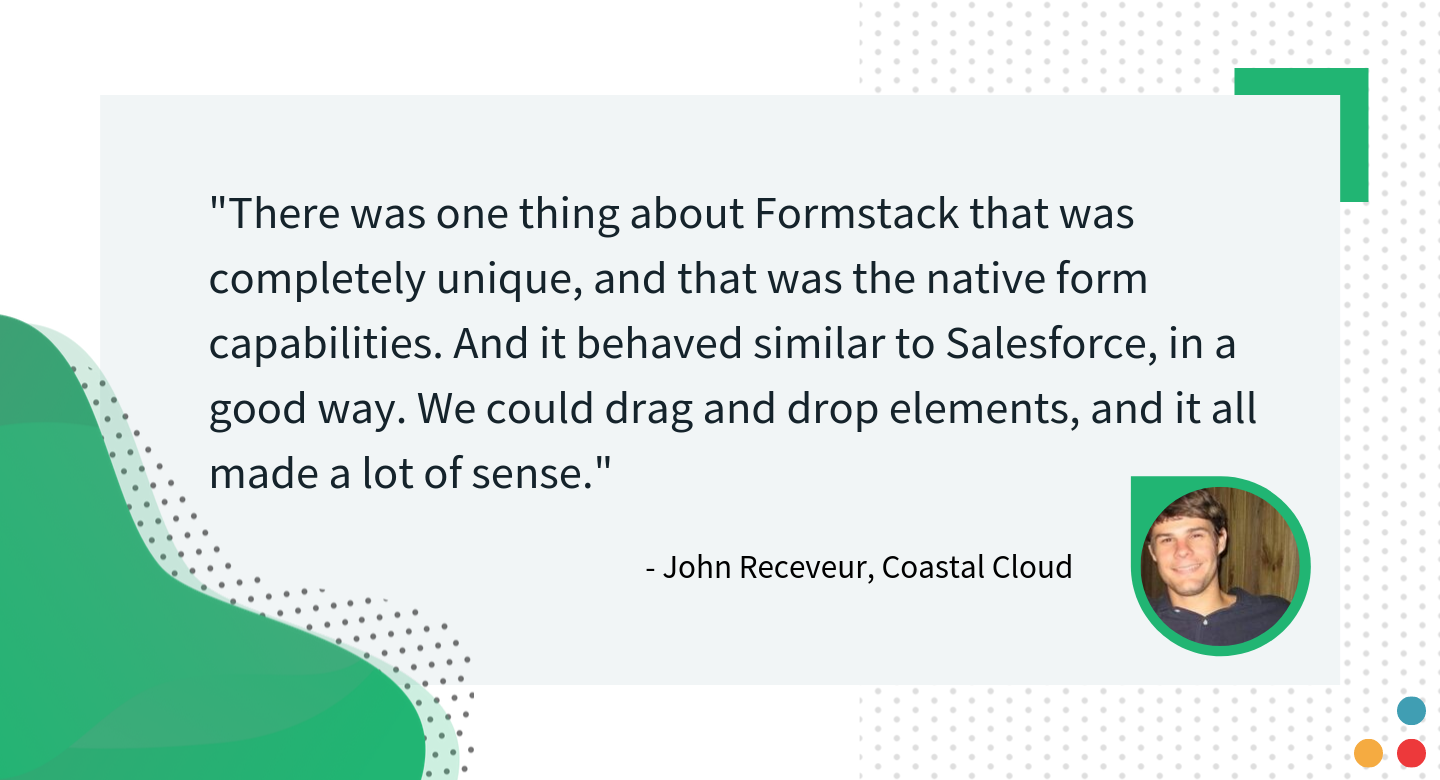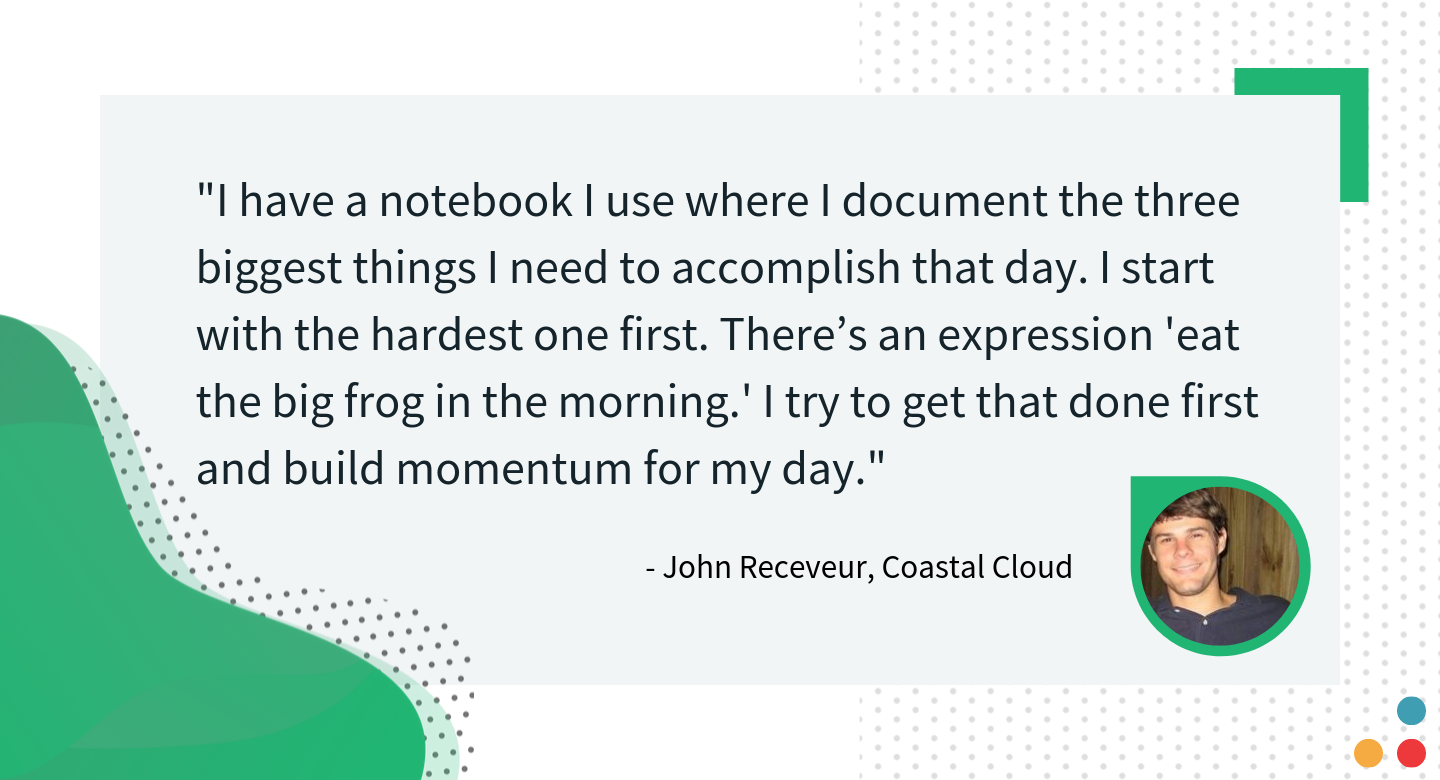Our VP of Partnerships Zak Pines recently sat down with John Receveur, Senior Consultant with Coastal Cloud, as part of our ongoing Partner Interview Series. Zak and John had a far-ranging conversation that touched on how to think about domain vs. system expertise; recurring data collection use cases; book recommendations; and hot dogs. Here’s an abridged transcript of the chat.
Background on Coastal Cloud
Zak: Can you start by sharing background on Coastal Cloud?
John: We are a Platinum Salesforce Partner focused on implementation and managed services mostly using just the Salesforce.com platform. We have grown a lot in the past few years and are almost 200 employees strong—all on shore.
Zak: So I gotta ask, what’s in the name? Why “Coastal Cloud”?
John: We were founded in Palm Coast, which is a city right on the ocean between Jacksonville and Daytona Beach, Florida—so, hence, the Coastal name. The company idea was to provide a "live at the beach" lifestyle since we could "work in the Cloud" virtually anywhere for any client.
We have since grown outside of Florida and have opened up solution centers in Louisville, Kentucky; DC; and Denver. We have employees based in every metro area across the country.
Zak: What types of businesses are you typically working with as customers?
John: We focus on a wide variety of industries, with our strongest being manufacturing, healthcare, high tech, communications, nonprofit, and government. We have the same skills and teams as some of the very large consulting firms, so we do have some very large clients, but we also focus heavily on medium-sized businesses.
Zak: You’re, therefore, bringing together both industry expertise by vertical and a system expertise around Salesforce. How does this impact how you go about recruiting and growing the team?
John: First, we want to make sure there is a cultural fit. From there, our philosophy is we want to typically hire for that industry expertise. We have the Salesforce know-how and can train around that as team members ramp with us. So for example, Erik Dunnigan is the head of our government practice, and he brings the domain knowledge as a former head of economic development for the state of Kentucky. We marry that domain expertise and Salesforce experience as part of a center of excellence for our customers.
One of the things I’ve realized is that Salesforce configuration is absolutely important, but that’s not the hard part. The hard part is ensuring that everyone understands the value drivers for the customer, and then creating the requirements that will deliver that value to the customer.
We also look, wherever possible, to standardize our solutions as we configure them multiple times. I mentioned Erik Dunnigan’s experience around economic development. In that vertical, we’ve built out templates we can pre-load that cover processes and workflows to allow customers to realize value more quickly, and we’re seeing a lot of growth with these templates as a result.
John’s Background & Role at Coastal Cloud
Zak: I always love to hear how people ended up in the roles they are in. How does that story go for you?
John: After I graduated from business school, I ended up back in Louisville, where I’m from. I was doing an internship with a venture capital firm here in Louisville, and some folks from there ended up creating a company to build a more intuitive mobile experience for Salesforce. It later evolved into an AI assistant for Salesforce. That experience got me very tuned into the Salesforce world, and I really learned the Salesforce platform.
Then I got introduced to the heads of Coastal Cloud, specifically our co-founder Sara Hale, at a time when Coastal Cloud was looking to expand in the Midwest. They were looking for a place to expand and wanted to stay out of the expensive markets like San Francisco and New York.
We believe there’s still a lot of tech talent in the prairies, you just have to dig a little deeper to find it.
Zak: What is your role at Coastal Cloud?
John: My title is Senior Consultant, and I’ve worn different hats over the years. I will often get involved as we are engaging with our prospects to help recommend and demonstrate technical approaches for what solutions our teams are discussing. I’ll also get involved in project scoping and estimates around cost and timeframe. And then I will do project work as well as act as a delivery lead.
Zak: When you’re working with customers, how do you approach the ongoing Salesforce administration? Is that typically done by Coastal Cloud or your customer?
John: Our philosophy is generally we want to teach the client how to fish. We do have managed service contracts, but we are very mindful in general of setting up a Salesforce environment that can be managed and updated by a customer—even if they don't have the internal technical capability.
I think of it as the “hit by the bus” scenario or, in a positive way, the “win the lottery” scenario. You don’t want to be dependent on custom development or one siloed resource if that resource were to one day go away. It takes organized documentation, cross-functional project management, and also using standardized tools—like Formstack—across Salesforce.
Coastal Cloud & Formstack
Zak: That’s a good segue to this: Do you know how Coastal Cloud got started with the Formstack for Salesforce product?
John: It was serendipitous. Several years ago we had a client that needed a more intuitive way to collect data on the web, and we looked at options for easily bringing data into their Salesforce instance from web forms.
There was one thing about Formstack that was completely unique, and that was the native form capabilities. It was all right there in Salesforce; it wasn’t another app that you needed to log into.

And it behaved similar to Salesforce, in a good way. We could drag and drop elements, and it all made a lot of sense. The customer had requirements around conditional logic and rules for how the forms should behave, and it could do all of that as well.
I recommended it to the client, they ended up using it for that use case, and it has been a great success for them and many other clients.
Zak: You mention the native form builder. What’s so powerful about that is being able to drive a form off of one or more Salesforce objects; pre-fill the data on that form; and allow a user to review, verify, and complete the form. Have you come across customer use cases where that hits the mark?
John: Yes I have. We have a lot of clients who struggle with keeping data up to date about their customers as time goes along.
Now we can manage campaigns so the Formstack form presents a customer with pre-filled information, where it’s then much faster to verify and update their status. We have a nonprofit customer where case managers need to follow up with their participants, and the workload is typically huge for these case workers. Anything they can do to automate the follow up at scale and collect the information back into their Salesforce system makes a meaningful impact.
Zak: Right. The more information you can pre-fill, the higher the response rates will be.
John: Exactly. These case managers don’t want to ask customers to repeat information. But it’s much easier if you ask them to verify information about themselves and just make the necessary changes. Now they have insight about their programs that they wouldn't have had otherwise, while actually easing the workload of their case managers.
Lightning Round
Zak: OK, John. Let’s zip through some lightning round questions.
John: Let ‘em rip.
Zak: What do you do to stay active?
John: I’m a big skier. I’m in the right place for that in Kentucky [laughs]. We get out to Colorado to do that from time to time, although lately we’ve been also checking out British Columbia. I also like to play golf.
Zak: What’s a recent book you recommend?
John: I really liked "The Hard Things About Hard Things" by Ben Horowitz. It harkened back for me to startup days working with the VC firm and entrepreneurs. It’s a reminder that when you’re starting something out, you don’t need to worry about scaling things. The first step is to put in the work to make things happen. It probably will be a grind. Later on you worry about scalability and process improvement over time.
Zak: One of Formstack’s key themes is productivity. What is your favorite productivity tip?
John: I have a notebook I use where I document the three biggest things I need to accomplish that day. I start with the hardest one first. There’s an expression “eat the big frog in the morning.” I try to get that done first and build momentum for my day.

Zak: What’s your favorite TV show?
John: I’m a fan of "Hard Knocks," the HBO show going behind the scenes on NFL teams.
Zak: What’s your go-to lunch during the workday?
John: Burrito bowls
Zak: Do you have any hidden talents?
John: I’d have to ask my wife to confirm, but I can spin up a decent meal for the family. My stir fry is pretty popular.
Zak: OK, John. This is the last question, and it’s a topic often debated by Formstack employees. Is a hot dog a sandwich?
John: No. It’s a hot dog.
Zak: Hard to argue with that.
Looking for your next step? Check out Formstack’s partner program for consultants, agencies, and tech partners.











